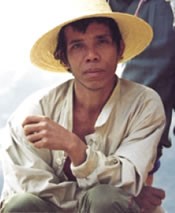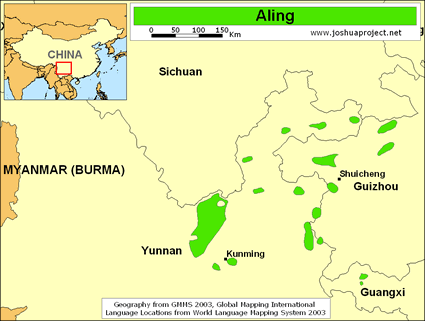We know very little about the history of the Aling. Few people have ever heard of them. They no longer wear any traditional clothing that might visually distinguish them from other groups.
The Aling are one of many subgroups of the Yi nationality in southern China. They view themselves as a distinct people group with their own history and language. The Han Chinese call the Aling different names in different locations. In Luliang County they refer to the Aling as Gan Yi (Sweet Yi). In Shizong County they call them Gan Yi (Dry Yi) (Here a different Chinese character for Gan is used). Also, in Shizong County the Aling refer to themselves as Awu but this is not the same as the Northern or Southeasten Awu in Yunnan. In Shilin County the Aling are known as the Yiqin or Yiqing.
They speak the local dialect of Mandarin Chinese, which probably is somewhat different than the Nasu, Wusa [yig] language, and is also somewhat different than Mandarin Chinese [cmn].
The majority of Aling inhabit 7 villages in Shizong County in Long Qing Township. Two of these villages, Shan Hei Ao Zi and Shao Wa Po are only Aling. The other 5 villages: Shui Dong Tian, Da Dou Wen, Xiao Dou Wen, Long Qing Village and Shan Chi Bu Ge are mixed villages, where the Aling live together with Han and perhaps another Yi subgroup. (None of the village names in Shizong County, listed in the Operation China Profile, 2000, where the Aling supposedly live are accurate). It is also reported that the Aling live in parts of Luliang, Luxi and Shilin counties.
The Aling is one of many groups in the area who celebrate the annual Torch Festival. According to one visitor, "The first two days of the festival were fairly rough and ready, but on the third day the girls had a chance to compete against one another in the beauty contest. The scene for this event was a leveled piece of ground on a mountain slope. Early in the morning, the slope was already crowded with girls carrying their yellow oilcloth umbrellas, looking from a distance like so many yellow blossoms on the grassland. I heard that girls from counties all around had set off for this contest two or three days before, making their way across mountains and rivers. The girls gathered together, formed circles and began a dance called duoluohe. The panel of judges consisted of elderly villagers. They shuttled about amidst the dancers trying to find suitable candidates. The first criterion was that she should be a Yi girl living in the countryside. The other criteria were simple: an oval face and a tall, slim figure."
The Aling have largely become assimilated into the Han Chinese culture, and no longer wear their distinctive traditional dress, but now dress exactly like the Han. They have also lost their mother language and now speak the local dialect of Chinese. They mainly celebrate the same festivals as the Han, such as the Chinese New Year (Spring Festival).
The Aling no longer consider themselves to be religious. Traditionally the Aling were animists, worshiping spirits in nature. They still probably practice ancestor worship, especially the elderly, during festivals and funerals.
The gospel has made no impact at all among the unreached Aling people group. They have never had the focused attention of missionaries or church planters. A 1922 mission report issued a challenge for workers to give their lives to reach the Yi, a challenge which still stands true today: "These aborigines are tall, strong, brave, keen, and clever, and some of them are extraordinarily anxious that missionaries should go and teach them. Whoever takes up this work needs to be courageous and to have plenty of grit. Such a one would become an uncrowned king."
The Aling people need to accept the warm embrace of the only Savior so they can enjoy spiritually meaningful lives.
Pray for the spiritual blindness and bondage to the evil one to be removed so they can understand and respond to Christ.
Pray for the Lord to provide for their physical and spiritual needs as a testimony of his power and love.
Pray that the Aling people will have a spiritual hunger that will open their hearts to the King of kings.
Pray for an unstoppable movement to Christ among them.
Scripture Prayers for the Aling in China.
Operation China, Asia Harvest, et al. Copyrighted © Used with permission
| Profile Source: Joshua Project |











